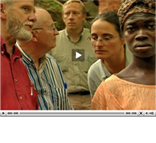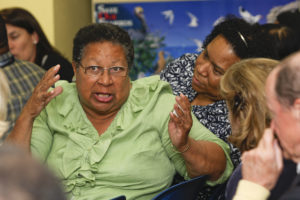

Current events point towards the need to get real with each other on issues of race in America…to find new words and the ability to listen that will move us past the vicious cycles we can so easily get stuck in. Traces of the Trade can be a catalyst for heart-to-heart dialogue, education and action through screenings in communities and classrooms…even in your living room. Many of us don’t take steps to address the black/white divide, in all its many forms, because the problems, the divisions, can seem so large and intractable. But as Rev. Ledlie Laughlin says in the film: “Today is the day!” Today is the day to make change.
The year 2008 marked the bicentennial of the U.S. abolition of the slave trade. We used this year as an inspirational opportunity in the U.S. to face the past, to understand its impact on present day race relations, and address this unresolved legacy.
The sesquicentennial (or 150th anniversary) of the U.S. Civil War took place from 2010 to 2015. These occasions provided further opportunities to recall, and to reevaluate the role of the north in slavery, the Civil War and subsequent racism.
Several of those involved with Traces of the Trade joined together in 2010 to found the Tracing Center on Histories and Legacies of Slavery, to educate the public about the history and legacy of slavery and race, in order to foster dialogue and encourage healing and justice. The Tracing Center offers public programs, as well as workshops in schools, churches, and other institutions, and professional training for educators and museum and historic site staff.
There are many steps you can take, on your own, or with others. We have suggestions below.
Suggested ways to get involved
Form a task force in your religious congregation, school, civic group, workplace or fraternal order to uncover the organization’s historic relationship to slavery, and/or form an anti-racism committee. Determine action that your institution might take to address legacies of slavery that you identify. Many groups support these efforts, such as The People’s Institute for Survival and Beyond, United to End Racism and others.
Research your local history of slavery/slave trade and ancillary businesses. What could you do in your community to honor the memory of those who were enslaved? Engage local historic sites and museums in conversation about how to tell this history in their tours and exhibits. Consider bringing a coalition of people together to create appropriate plaques and memorials.
Engage a particular school you are connected to, your local school district, and/or text book companies, in a dialogue about how to teach the history of the slave trade/slavery in ways that include the role of the North as well as the South, and which describe the centrality of slavery for the political, economic, and social development of the U.S.
Learn more about the legacy of slavery today and take public action. There are countless non profit organizations in the U.S. working on these issues that you can find online, for example; Color of Change or the Program on Inequality and the Common Good of the Institute for Policy Studies, which offers information and resources on how inequality undermines U.S. democracy, economic health and civic life. Here are more groups you can connect with that are dedicated to healing.
Learn about legislative proposals. Click here to learn more about legislation on the state and national level, regarding apologies for slavery and H.R. 40, the “Commission to Study and Develop Reparation Proposals for African Americans Act.”
Find out if your state is considering an apology bill. For more information, see Rhode Island’s story.
Communities of faith can engage on many levels including via sermons, creating liturgies/rituals of atonement and reconciliation, getting involved in your local community, partnering with a congregation with members of a different racial group, advocating for resolutions in your larger church body, and for legislation.
Create a book discussion group. Tom DeWolf is one of the family members featured in the film. He has written a book that shares more about the family journey: Inheriting the Trade: A Northern Family Confronts Its Legacy as the Largest Slave-Trading Dynasty in U.S. History (Beacon Press, 2008). Tom DeWolf is also co-author of another book: Gather at the Table. Create a group to read and discuss the books. Your group could also read and discuss the articles on white privilege listed in the Resources section of the Traces of the Trade discussion guide.
Expand your experience. In the film, Josephine Watts suggests that white people make a point of attending a black play or concert in order to experience –to a small degree–what she experiences regularly as the only black person at a conference. If you have not had such experiences, make plans to attend an event where you are the only person of your race, ethnicity, or gender in the room.
Research connections between Native American history, Latino history, and Asian-American history and the history of African slavery and its aftermath. Use what you learn to expand the dialogue so that it is not exclusively focused on black/white issues. Think about ways to include in your discussions the perspectives of those who identify as being of more than one race.
Gather your family at the dinner table and have a discussion about family history and the history of race in the U.S. Use the discussion guide to inspire your dialog, or watch the film together and just see what happens, but use the private space of your home to have an honest conversation about what you see in your own family.
How could you celebrate July 4th differently? In 1852 Frederick Douglas delivered a famous speech in which he said: “This Fourth of July is yours, not mine. You may rejoice, I must mourn.” How can we reflect on the good and bad of our history and learn from it all?
Support the campaign to end modern slavery. Slavery still exists in many forms in the world today. See the American Anti-Slavery Group for more information on how you can get involved.

